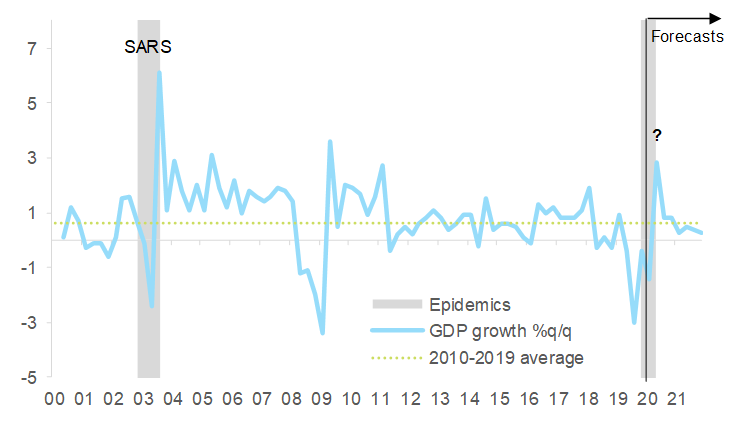Hong Kong’s GDP declined again in Q4 2019, by -0.4% q/q from the previous quarter. In y/y terms, the -2.9% decline in Q4 2019 constitutes the largest quarterly slowdown since the global financial crisis. This brings growth for 2019 at -1.2%, down from +3.0% in 2018. The breakdown shows that the recession continues to be broad-based. In particular, the y/y decline accelerated for investment and external trade of services.
The Hong Kong economy is facing the triple whammy of trade tensions, social unrest and the coronavirus epidemic. The Phase One deal between China and the U.S. helps removing some downside risk, but high tariffs remain in place and still soft global growth puts a lid on the recovery of trade. Continued protests in Hong Kong are still hurting investor sentiment and have been deterring visitors (particulary from mainland China) since last summer. More recently, the coronavirus outbreak constitutes another downside risk for Hong Kong’s economy[1]: through the direct channel due to the ‘fear factor’ and containment measures, and through the indirect channel of a more pronounced slowdown in the Chinese economy.
Policy reaction is not enough to make up for downside pressures. Since August last year, authorities have announced five rounds of fiscal support measures. They amount in total to c. 1.2% of GDP, and have not been able to engineer a recovery or anchor investor confidence. Coupled with reduced fiscal revenues, this could lead to Hong Kong’s first fiscal deficit in more than fifteen years in 2019. Low public debt should however provide some room for manoeuvring in the short term. The fiscal balance may have declined to -0.3% of GDP in 2019 after 2.3% in 2018, and we expect widening of the deficit in 2020, to -0.6% of GDP. On the monetary side, the Hong Kong Monetary Authority has room to defend the HKD’s peg to the USD, with FX reserves almost twice the size of the monetary base.
Looking forward, the recession might deepen in Q1 2020. We are revising negatively our forecast for Hong Kong’s Q1 GDP growth from 0.6% to -1.4% q/q, due to the economic impact of the coronavirus epidemic. The Hong Kong Hang Seng Index has declined by c. 8.5% since 20 January, as markets are pricing in the risk of protracted lower growth. After the epidemic is contained, the recovery of the Hong Kong economy will depend on the intensity of continued social unrest. We now expect Hong Kong’s GDP growth at -0.6% in 2020, with downside risks to this number. We forecast insolvencies to increase by +9% in 2020 (after +4% expected for 2019). Tourism, retail, food and accommodation services in particular will probably continue to be hit.
[1] The SARS epidemic led to a technical recession in Hong Kong in Q2 2003. A quick recovery in GDP growth happened thereafter.


